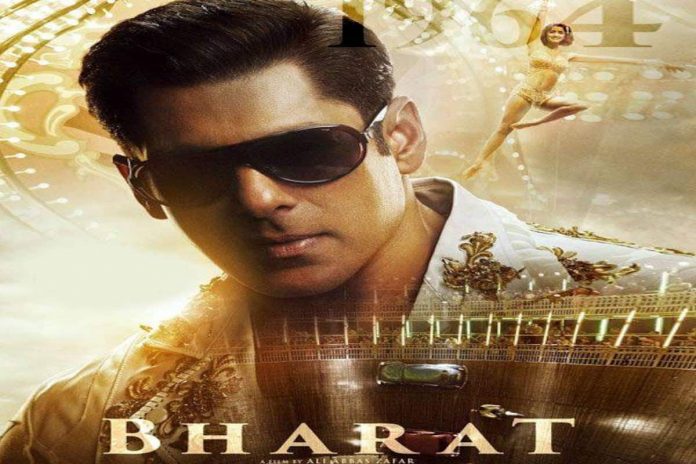Salman Khan Films, Reel Life Production Pvt. Ltd. and T-Series’ Bharat (UA) is the story of a family separated at the time of the India-Pakistan Partition.
Gautam Kumar (Jackie Shroff) works as a station master in Lahore. It is 1947 and communal riots have broken out. Hindus from Lahore are all headed to Bharat (India) just as Muslims from India are fleeing to Pakistan. Gautam Kumar, wife Janki Devi (Sonali Kulkarni) and their four little children, like thousands of others, are trying to escape from Lahore to India. Bharat (Kabir Sajid), who is barely 9-10 years old, is the oldest of the four children of Gautam Kumar.
There is just one train at Mirpur railway station but thousands and thousands of people waiting to escape. Somehow, Gudiya (who is younger than Bharat) can’t board the train as she is lost in the sea of humanity on the railway platform. Gautam Kumar climbs down from atop the train to search for Gudiya. While climbing down, Gautam tells Bharat to promise him that he would take care of the family and keep them all together in case he (Gautam Kumar) and Gudiya were to miss the train. The two, in fact, miss the train. Bharat and the rest of the family are devastated on being separated.
Bharat, his mother and his two kid-siblings reach the home of Gautam Kumar’s sister (Ayesha Raza Mishra) and brother-in-law (Kumud Mishra).
Bharat, his mother and his two kid-siblings reach the home of Gautam Kumar’s sister (Ayesha Raza Mishra) and brother-in-law (Kumud Mishra).
Years pass by. Bharat (Salman Khan) is now a young man and he has a childhood bosom pal in Vilayati Khan (Sunil Grover), whom he had met when he had reached India. To make both ends meet, Bharat takes up a job in a circus where he does death-defying stunts. In the circus, he meets Radha (Disha Patani). Radha loves Bharat and he also reciprocates. But before long, Bharat quits the circus.
The employment situation in the country is bad. Bharat and Vilayati somehow manage to convince supervisor Kumud (Katrina Kaif) to send them to the UAE to work in oil fields. Kumud herself accompanies the Indian workers to the UAE and, before long, she falls in love with Bharat. On his part, Bharat also loves her and is, in fact, in awe of her. But he turns down her proposal for marriage as he fears, the promise he had made to his dad would be broken if, after marriage, he’d get busy with the wife and start ignoring his family.
Back in India, Bharat and Kumud start living in together (with the blessings of Bharat’s mother) because Bharat is convinced that his marriage would somehow go against his endeavour to fulfill the promise he had made to his father many years ago. After all these years, Bharat is still hopeful that he would find his father and younger sister.
Soon, Bharat and Vilayati take up jobs on a ship to earn a lot of money as Bharat wants to solemnise sister Mehek’s (Kashmira Irani) marriage with a lawyer (Aasif Sheikh). While they are away on the ship, Kumud leaves her new job of a television news reader and helps Bharat’s family look after the family shop.
Soon, Kumud gets a job in Zee TV. Before long, India and a Pakistani television channel decide to run simultaneous programmes in their respective countries to assist people trace their family members or relatives who may have gotten separated during the horrifying Partition days. Kumud prevails upon Bharat to participate in the programme, like many others.
Does Bharat find his father? Does the family reunite after so many years?
The film is based on Korean film Ode To My Father. The Indianised version of the story is written by Ali Abbas Zafar. The story is inherently emotional as it is about a family separated during Partition. But the problem is with the screenplay, penned jointly by Ali Abbas Zafar and Varun V. Sharma. The screenplay is very weak.
For one, in their quest to make an entertaining fare rather than just an emotional journey of an ordinary man, the two writers have laced the drama with humour and comedy, both of which greatly dilute the emotional core of the story. What the two writers should have done was to include a separate humour or comedy track rather than weaving the humour and comedy around Bharat and his near and dear ones. With Bharat and his close ones doing comedy or having so much fun, the emotional turmoil of the family is relegated to the sidelines. In other words, the core becomes an aside – and that’s not right. Frankly, the film’s opening prepares the audience for a tear-jerker as the family gets separated right at the start. To then make an entertainer rather than a tear-jerking fare is akin to cheating the audience. The writers have wrongly judged that entertainment cannot come from emotions. The fact is that crying tears of joy or simply crying in a film show can also be entertaining.
Secondly, although Bharat keeps talking about his promise to his dad, he is not shown to be the family’s emotional anchor. He may have promised his father that he would keep the family together as a unit but what that presupposes is that he would be their emotional anchor. However, what the viewers see him is being the family’s financial support system. After the terrible tragedy the family goes through during Partition, the audience is more keen to see Bharat rise to the occasion as an emotional anchor of the family. Unfortunately, there are as good as no scenes of emotions between Bharat on the one hand and his other family members on the other.
Further, the screenplay shows Bharat romancing Radha first and Kumud later, singing songs, dancing, fooling, etc. No doubt, a man who has had a tragedy in the family many years ago will at some point start leading a normal life but if the screenplay concentrates on only his romances, songs, dances, comedy etc., the audience will not feel his pain of so many years ago. As for the sacrifice of not marrying Kumud despite loving her, the audiences wonder why after all isn’t he marrying her. His marriage in no way goes against what he had promised his father. Bharat’s remark to Kumud that he was scared that if he married her, he’d be breaking the vow he had made to his father looks too convenient and cooked-up. What’s even worse is that instead of sitting down and forcing Bharat to marry the girl he loves (Kumud), his mother tells both of them that they should do what they feel is right. Although that can never be the intention of the writers, it almost makes Bharat’s mother look selfish and self-centred. If Bharat thinks, his marriage would be taking him away from fulfilling his vow, at least the mother could correct him about his baseless presumption. In fact, Bharat should have hastened to marry a girl like Kumud as she would be a fantastic emotional support for the family. And when Bharat and Kumud opt for a live-in relationship (way back in or around 1970), the viewers wonder what, after all, is the sacrifice which Bharat is making.
Frankly, even if Bharat hadn’t given his word to his father in 1947, that he would keep the family united, wouldn’t it have been his responsibility to look after the family as he was the eldest child in the family? So then, what’s all this drama of being true to his word?
This is not to say that there are no plus points in the screenplay. Of course, there are. The entire sequence of India-Pakistan television programmes is heart-wrenching and will make women and even several men sob in their seats. But that comes so late that the audience yearns for emotional and melodramatic moments and episodes before that. Some light moments are also entertaining.
The first half looks scattered and so, the overall impact is not what it should’ve been. What was needed was more original light moments and also more heartwarming and heart-wrenching moments. The first about 25-30 minutes of the post-interval portion are extremely boring, dull, dry and dreary. The portions on the ship (except when Bharat and the others dance to Amitabh Bachchan songs) are the weakest in the drama and should have been advantageously deleted. Emotions are abundant in the India-Pakistan sequence but in the rest of the film, their shortage is sorely felt.
Dialogues, written by Ali Abbas Zafar and Varun V. Sharma, are good but the need was of punch-packed, clapworthy and emotions-laden dialogues.
Salman Khan acts very well. He is the best as the old man and his humour in that phase of his life is very endearing. His emotional scenes are terrific. Salman’s honesty and integrity on his face help the character of Bharat a great deal. However, he does not look his usual handsome self as the young man. Here, it must be added that Salman’s die-hard fans will not feel elated to see him in this film. Katrina Kaif does an outstanding job. She has worked hard on her accent and her voice modulation (in her old age) and the results are fantastic. Her performance is effortless and with this film, she proves that there is lots more to her than just pretty looks. To say that Katrina has looked mind-blowingly beautiful would not be an exaggeration. Her curly hair, sarees with sleeveless blouses, bindi on her forehead – they all make her look bewitching. Sunil Grover does a fine job as Vilayati Khan. He is very natural but it must be added that the film doesn’t present him in the way his innumerable small-screen fans would have wanted to see him on the big screen. Disha Patani looks hot and dances beautifully. Acting-wise, she gets limited scope as Radha. Jackie Shroff makes his mark in a brief role as Gautam Kumar. Sonali Kulkarni lends fine support as Bharat’s mother. Shashank Arora (as Bharat’s younger brother), Kashmira Irani (as Bharat’s sister) and Ayesha Raza Mishra (as Bharat’s paternal aunt) are adequate. Aasif Sheikh (as Bharat’s brother-in-law) has his moments and he makes good use of them. Satish Kaushik acts very well but his comic track doesn’t really add much because it is too frivolous. Brijendra Kala makes his presence felt. Kumud Mishra gets very limited scope as Bharat’s uncle and appears to have been wasted. He does well. Tabu springs a surprise and adds star value. Her acting is very natural. Nora Fatehi exudes sex appeal but her track seems irrelevant and can safely be deleted. Rajiv Gupta stands his own as Gulati. Meiyang Chang is good as Jimmy. Kabir Sajid is lovely as the school-going Bharat. Aaryan Prajapati shines as little Vilayati Khan. Matin Rey Tangu is cute as little Jimmy. Others do as required.
Ali Abbas Zafar’s direction is very good. Some of his directorial touches (like the one in which Janki Devi realises in a couple of seconds that the man on the Pakistani TV channel is not her husband even as Bharat is still hopeful that he could be his father who he is searching for) are brilliant. However, in his quest to make an all-round entertainer, he has, to a large extent, lost sight of the film’s emotional core, forgetting that sometimes, heartwarming and heart-wrenching emotions can provide the greatest entertainment. Frankly, his adaptation of the Korean film (Ode To My Father) is flawed. Music (Vishal-Shekhar) is good but the absence of superhit or even hit songs is badly felt. ‘Slow motion’, ‘Aithe aa’, ‘Chashni’, ‘Turpiya’ and ‘Zinda hoon main’ are well-tuned. Lyrics (Irshad Kamil) are nice. Song picturisations (Vaibhavi Merchant and Adil Shaikh) are veritably eye-filling. Julius Packiam’s background music is impactful but not remarkable. Marcin Laskawiec’s cinematography is excellent. Action and stunt scenes (Seayoung Oh, Parvez Shaikh and Dave Judge) are thrilling. Production designing by Acropolis (Rajnish Hedao, Snigdha Basu and Sumit Basu) is lovely. Rameshwar S. Bhagat’s editing could have been crisper.
On the whole, Bharat is below-average in merits but it will do above-average business because of the Eid advantage and the Salman Khan factor. At the box-office, it will not at all be able to become a landmark film like some of Salman Khan’s and Ali Abbas Zafar’s earlier films. In other words, its business at the ticket windows will fall greatly short of the high expectations. Taking into account its recoveries from satellite, digital and audio rights, its overall business will, of course, exceed its high cost, making it a paying proposal in pure commercial terms. But that’s just not enough when it’s a Salman Khan film. His fans need to feel elated but in this case, his fans will feel terribly let down.
Released on 5-6-’19 at Regal (daily 4 shows) and other cinemas of Bombay thru AA Films. Publicity: very good. Opening: extraordinary. …….Also released all over. Opening was mind-blowing everywhere. But collections dropped by 30% on the second day in spite of Baasi Eid. There was a noticeable drop in collections on the third day too.





























